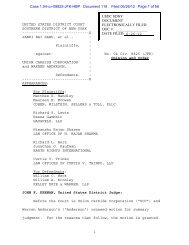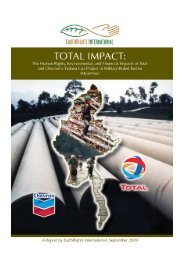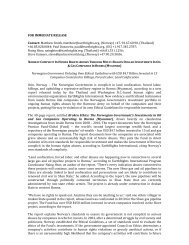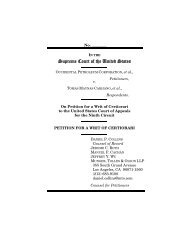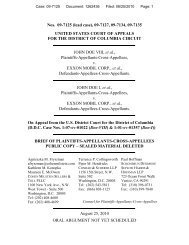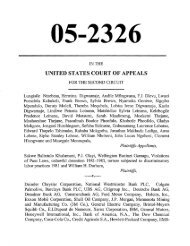The Oil Industry and Human Rights in the Niger Delta - EarthRights ...
The Oil Industry and Human Rights in the Niger Delta - EarthRights ...
The Oil Industry and Human Rights in the Niger Delta - EarthRights ...
You also want an ePaper? Increase the reach of your titles
YUMPU automatically turns print PDFs into web optimized ePapers that Google loves.
People were put out of jobs because of <strong>the</strong> condition of no fish <strong>in</strong> <strong>the</strong>river<strong>in</strong>e area, <strong>and</strong> that <strong>the</strong> lagoon becomes silted up, becomes dry. And . . . <strong>the</strong>rewas no job opportunity for <strong>the</strong> <strong>in</strong>digene <strong>in</strong> <strong>the</strong> community. 11<strong>The</strong> saltwater <strong>in</strong>cursions also kill o<strong>the</strong>r useful plants, as related by Chief NicholasOmomowo:Before <strong>the</strong> canal was dug . . . we are fell<strong>in</strong>g timbers. When timber logs are felled,we used to br<strong>in</strong>g <strong>the</strong>m to Lagos for sale, [<strong>and</strong> use] <strong>the</strong> wood for <strong>the</strong> constructionof our houses. Because that type of wood does not germ<strong>in</strong>ate under salty water,<strong>the</strong> wood, <strong>the</strong> trees, were destroyed. . . .[In addition to] <strong>the</strong> trees <strong>and</strong> <strong>the</strong> timbers . . . <strong>the</strong>re’s o<strong>the</strong>r th<strong>in</strong>gs that wecall <strong>the</strong> palm tree poles. We use <strong>the</strong> poles of palm trees for <strong>the</strong> construction ofour houses. But we f<strong>in</strong>d that those th<strong>in</strong>gs are not used to salty water, <strong>the</strong>y’ve beenentirely destroyed <strong>and</strong> we don’t have <strong>the</strong>m for <strong>the</strong> construction of our housesaga<strong>in</strong>. 12This pattern has been observed <strong>in</strong> many communities, result<strong>in</strong>g <strong>in</strong> disruption oftraditional lives <strong>and</strong> livelihoods.Gas FlaresAfter its extraction, pipel<strong>in</strong>es carry petroleum to a flow station, where gas is separated outfor ref<strong>in</strong><strong>in</strong>g or flar<strong>in</strong>g. In <strong>Niger</strong>ia, most gas extracted through <strong>the</strong> oil production processis flared – gas which, if ref<strong>in</strong>ed, would have a total value of $15 million each day. Gasflar<strong>in</strong>g creates large quantities of soot, smoke, <strong>and</strong> o<strong>the</strong>r air pollutants. Mercury, benzene<strong>and</strong> lead are common contam<strong>in</strong>ants, which are often released <strong>in</strong>to <strong>the</strong> environment if <strong>the</strong>gas is flared at temperatures that are too low. This cocktail of chemicals causes cancers,respiratory diseases <strong>and</strong> blood disorders. Flar<strong>in</strong>g also releases nitrogen oxide <strong>and</strong> sulfurdioxide, creat<strong>in</strong>g acid ra<strong>in</strong> that kills fish <strong>and</strong> defoliates vegetation. <strong>The</strong>se impacts are<strong>in</strong>tensified when <strong>the</strong> gas is flared from flare stacks, some of which are horizontal <strong>and</strong> atground level.Philemon Ebiesuwa, a community leader with college-level scientific tra<strong>in</strong><strong>in</strong>g, described<strong>the</strong> effects of Chevron’s gas flar<strong>in</strong>g near his home <strong>in</strong> <strong>the</strong> community of Awoye:What I observe is that <strong>the</strong>re is constant gas flar<strong>in</strong>g from <strong>the</strong> flow station,Opuekeba, which releases <strong>in</strong>to <strong>the</strong> atmosphere around Awoye some dangeroushydrocarbon particulates, like hydrogen sulfide, sulfur dioxide, nitrogen dioxide.And when this one mixes with ra<strong>in</strong>water, it changes to weak acid, maybe sulfuricacid <strong>and</strong> some o<strong>the</strong>r weak acid, which makes <strong>the</strong> roof<strong>in</strong>g of <strong>the</strong> people, those whouse corrugated iron, to go bad quickly, to rust. Because this weak acid from acidra<strong>in</strong> corrodes <strong>the</strong> build<strong>in</strong>g around <strong>the</strong> area. . . .11 Deposition of Monday Omosaye <strong>in</strong> Bowoto v. Chevron Corp. at 17:3-14, 19:13-20 (Aug. 18, 2005).12 Deposition of Chief Nicholas Omomowo <strong>in</strong> Bowoto v. Chevron Corp. at 342:15-344:10 (Jan. 28, 2005).Page 5 of 29



